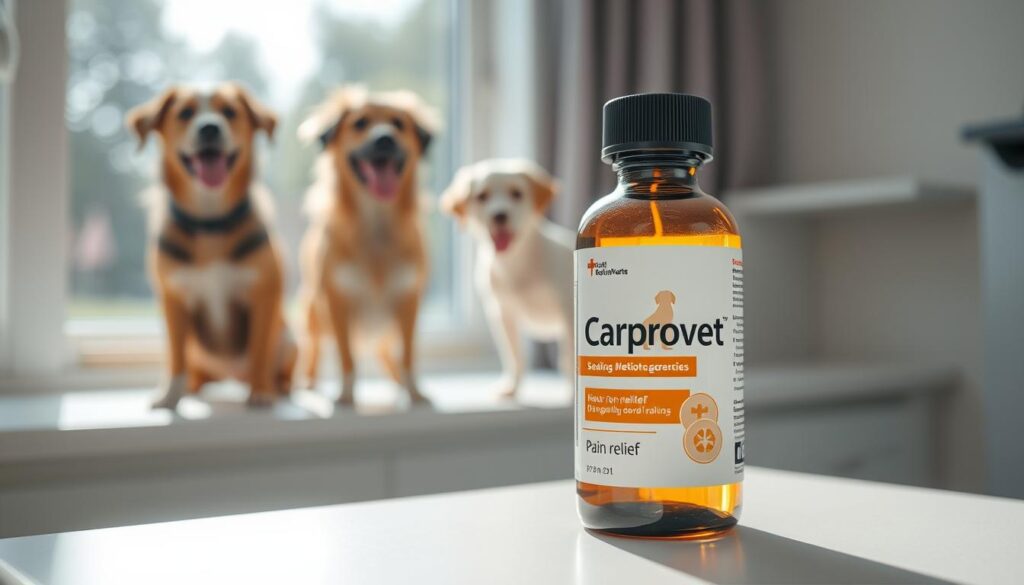Carprovet is a trusted solution for managing pain in dogs. This non-steroidal anti-inflammatory drug (NSAID) offers safe and effective relief. Let’s explore Carprovet’s uses, dosages, side effects, and safety considerations.
As a pet owner, you want the best care for your furry friend. This article will help you make informed decisions about your dog’s well-being. You’ll learn how Carprovet can improve your dog’s quality of life.
Table of Contents
ToggleKey Takeaways
- Carprovet is a popular NSAID prescribed by veterinarians to alleviate pain and inflammation in dogs.
- It is FDA-approved for the treatment of osteoarthritis, post-operative pain, and other inflammatory conditions.
- Carprovet is available in both oral and injectable forms, with dosages determined by a dog’s weight.
- Potential side effects include gastrointestinal issues, liver or kidney damage, and changes in appetite or behavior.
- Certain pre-existing conditions may contraindicate the use of Carprovet, so it’s essential to consult with a veterinarian.
What is Carprovet?
Carprovet is a non-steroidal anti-inflammatory drug for dogs. It’s the generic name for carprofen, also known as Rimadyl, Novox, and Vetprofen. Vets prescribe this medication to reduce inflammation and manage pain in dogs.
Carprofen for Dogs: A Non-Steroidal Anti-Inflammatory Drug (NSAID)
Carprovet is a prescription NSAID that helps dogs with pain and inflammation. It works by blocking prostaglandins, which cause pain and swelling. This makes it effective for various canine conditions.
Carprofen: The Generic Name and Brand Names
Carprofen is Carprovet’s active ingredient. It’s available under brand names like Rimadyl, Novox, and Vetprofen. These brands contain the same active ingredient but may have different formulations.
Vets use Carprovet to ease pain and inflammation in dogs. This NSAID can help improve your dog’s health and comfort. It’s a valuable tool for managing canine well-being.
Uses of Carprovet for Dogs
Carprovet is a versatile medication for dogs. It addresses various pain and inflammatory conditions. Vets often prescribe Carprovet to reduce inflammation and manage acute and chronic pain.
This medication helps with osteoarthritis, post-surgical recovery, and soft tissue injuries. Carprovet works by inhibiting inflammatory mediators. It can effectively ease your dog’s discomfort and boost their quality of life.
Pain Management and Inflammation Reduction
Carprovet primarily manages pain and reduces inflammation in dogs. It relieves pain from osteoarthritis, a common joint disease in older dogs. The medication also helps control postoperative pain from soft tissue and orthopedic surgeries.
Acute and Chronic Pain Relief
Carprovet effectively relieves both chronic and acute pain in dogs. It targets underlying inflammation to ease discomfort from injuries or sudden trauma. The medication can improve your dog’s mobility in both short-term and long-term conditions.
“Improvement in dogs’ mobility can be dramatic when on Carprovet, with most dogs showing improvement within days.”
Carprovet is a prescription drug for dogs. Always follow your vet’s instructions when giving this medication. Proper use of Carprovet can help your furry friend find relief and enjoy life more.
Carprovet Dosage and Administration
Proper Carprovet dosage is vital for your dog’s pain relief. Your vet will decide the right amount based on your dog’s weight and condition. They’ll consider these factors to ensure the best treatment for your furry friend.
Recommended Dosage Based on Weight
The standard Carprovet dose is 2 mg per pound of body weight. For example, a 50-pound dog would need 100 mg of Carprovet. You can give the total daily dose once or split it into two doses 12 hours apart.
Oral Tablets and Injectable Forms
Carprovet comes in oral tablets and injectable forms. Vets often prescribe oral tablets for at-home use. The injectable version is typically used in hospitals.
Oral tablets are scored, making it easy to divide them into the right dose. This feature helps you give your dog the exact amount needed based on their weight.
| Dog Weight | Carprovet Dosage | Tablet Strength |
|---|---|---|
| 10 lbs | 20 mg | 1/2 tablet (25 mg) |
| 20 lbs | 40 mg | 1 tablet (50 mg) |
| 50 lbs | 100 mg | 2 tablets (50 mg each) |
| 80 lbs | 160 mg | 3 tablets (50 mg each) |
Always follow your vet’s instructions when giving Carprovet to your dog. They may need to adjust the dose based on your dog’s needs and response to the medication.
Potential Side Effects of Carprovet
Carprovet is generally safe for dogs but can cause mild side effects. These include stomach issues, decreased appetite, and fatigue. Rarely, serious effects like neurological symptoms or organ damage may occur.
Common Mild Side Effects
- Gastrointestinal issues (e.g., vomiting, diarrhea, decreased appetite)
- Fatigue
Watch your dog closely for any bad reactions to Carprovet. Report any issues to your vet right away. Carprovet is quickly absorbed when given orally to dogs.
The drug reaches peak blood levels within 1-3 hours. It has a mean half-life of about 8 hours. Carprovet is mainly processed in the liver.
The body removes Carprovet through feces (70-80%) and urine (10-20%). Safety studies haven’t shown kidney toxicity at ten times the normal dose.
Stop giving Carprovet if your dog has any bad reactions. Contact your vet immediately for advice and proper treatment. Your vet will guide you on the next steps.
Contraindications and Precautions for Carprovet
Carprovet can relieve pain in many dogs. However, it may not suit all canines. Dogs with kidney disease, liver issues, or bleeding disorders need special care.
Conditions Where Carprovet is Not Recommended
- Kidney disease: Carprovet can potentially exacerbate kidney problems, so it is generally not recommended for dogs with existing kidney disease.
- Liver disease: Similar to kidney disease, Carprovet may worsen liver issues, so it should be avoided in dogs with liver problems.
- Bleeding disorders: Carprovet can interfere with normal blood clotting, making it unsafe for dogs with bleeding disorders.
- Severe dehydration: Dehydration can increase the risk of adverse effects from Carprovet, so it should be used with caution in dehydrated dogs.
- Allergic reactions: Dogs with a history of allergic reactions to non-steroidal anti-inflammatory drugs (NSAIDs) like Carprovet should not be given the medication.
Medication Interactions with Carprovet
Some medications can react badly with Carprovet. It’s best to avoid or use caution when combining them.
- Steroids: Combining Carprovet with steroids can increase the risk of gastrointestinal ulcers and other adverse effects.
- Anticoagulants: Carprovet may interact with blood-thinning medications, increasing the risk of bleeding.
- Diuretics: Certain diuretic drugs can worsen the potential kidney-related side effects of Carprovet.
Talk to your vet about your dog’s health before using Carprovet. Discuss any existing conditions or medications.
Regular check-ups and vet advice ensure safe Carprovet use. This helps keep your furry friend healthy and pain-free.
Monitoring and Follow-Up Care
Regular monitoring is vital when your vet prescribes Carprovet for your dog. This ensures the medication works well and is safe. Your vet may perform physical exams, bloodwork, and observe your dog’s symptoms.
Bloodwork checks your dog’s liver and kidney function while on Carprovet. Routine blood chemistry rechecks every 6 months are recommended for dogs on long-term Carprovet use.
Your vet will schedule follow-ups to track your dog’s progress. They may adjust the Carprovet dosage if needed. These veterinary checkups provide an opportunity to discuss your dog’s response to the medication and address any concerns or side effects you may have observed.
Open communication with your vet is key for safe Carprovet use. Follow their advice for monitoring and follow-ups. This ensures your dog gets the best care and pain management.
| Monitoring Recommendation | Frequency |
|---|---|
| Bloodwork (complete blood cell count and chemistry panel) | Every 6 months |
| Veterinary Checkups | Periodic (as recommended by your veterinarian) |

“Maintaining open communication with your veterinarian and following their recommendations for monitoring and follow-up care is crucial for the safe and effective use of Carprovet.”
Safety Tips for Administering Carprovet
Follow your vet’s instructions when giving Carprovet to your dog. Give it with food to reduce stomach issues. Never crush or change the medication without asking your vet first.
Proper Storage and Handling
Proper storage and handling of Carprovet is vital. It keeps the medicine effective and prevents accidents. Here are some key safety tips:
- Store Carprovet in a secured, dry place, away from direct sunlight and out of reach of children and pets.
- Keep the medication in its original container with the label intact to ensure you can easily identify the contents.
- Dispose of any expired or unused Carprovet tablets properly, following the instructions provided by your veterinarian or local authorities.
- Avoid touching the medication directly with your bare hands; use gloves or a designated measuring device to handle Carprovet.
- Monitor your dog closely after administering Carprovet and report any unusual symptoms or side effects to your veterinarian immediately.
These safety rules help ensure safe use of Carprovet for your dog. They aid in managing pain and inflammation effectively.
Your vet is the best source for questions about Carprovet. Ask them about proper use, storage, and handling of this medication.
Carprovet: A Veterinary-Approved Pain Relief Option
Carprovet is an FDA-approved medication for managing pain in dogs. This veterinary-approved NSAID relieves canine patients suffering from osteoarthritis and post-surgical pain. It’s a trusted choice among vets for its safety and effectiveness.
Carprovet improves dogs’ quality of life by reducing inflammation and discomfort. Vets often recommend it as a first-line pain relief treatment. Its careful formulation meets the specific needs of our canine friends.
Carprovet comes in various FDA-approved forms, including tablets, caplets, and chewable treats. This variety allows for easy and flexible administration. Pet owners can choose the right product for their dog’s needs and preferences.
“Carprovet has become an invaluable tool in my veterinary practice, helping me provide safe and effective pain relief for my canine patients. Its reliability and ease of use make it a go-to option for managing a wide range of painful conditions.”
– Dr. Emma Thompson, Veterinarian
Carprovet is a reliable, veterinary-approved option for pet owners. It helps alleviate canine discomfort and boost overall well-being. By targeting pain and inflammation, Carprovet can improve dogs’ mobility and activity levels.

Alternatives to Carprovet for Dogs
Carprovet is a popular pain medication for dogs. However, sometimes other options may be more suitable. Vets might suggest exploring different treatments for your furry friend’s discomfort. These can include natural pain relief methods, supplements, and physical therapy.
These alternatives can work alongside or replace Carprovet. They offer a more complete approach to managing your dog’s pain. Always consult your vet before trying new treatments.
Natural Pain Relief Options
Several natural pain relief options exist for dogs. These can be great alternatives to Carprovet. Let’s explore some of these options.
- Green Lipped Mussels (GLM): Studies show GLM manage inflammation as well as NSAIDs. They don’t harm dogs’ joints. Give 200 mg of GLM daily per 10 lbs of body weight.
- NEM® (Natural Eggshell Membrane): This supplement improves pain by 23.6% and joint function by 26.8%. Give 60 mg per 10 lbs of body weight daily.
- Turmeric: This spice contains curcumin, which works as well as ibuprofen for joint pain. It could be a good option for dogs too.
- CBD Oil: Hemp-derived CBD oil may help with various types of pain. It’s considered very safe for dogs.
These natural options can provide relief for your dog. However, always talk to your vet first. They can guide you on proper dosages and safety for your dog.
“Green Lipped Mussels (GLM) are as effective as NSAIDs at managing inflammation in dogs without harming their joints.”
Conclusion
Carprovet safely relieves pain in dogs with various conditions. It can improve their quality of life significantly. Dog owners should consult vets to determine if Carprovet suits their pets.
Research shows Carprofen outperforms tramadol for post-operative pain relief in dogs. Studies comparing Carprofen and meloxicam for canine osteoarthritis lack strong evidence. More research is needed to assess these options thoroughly.
Proper use of Carprovet can help manage your dog’s discomfort effectively. It may lead to a more active, comfortable life for your pet.
Work closely with your vet to ensure safe pain relief for your dog. Regular monitoring and follow-up care are crucial for optimal results.
FAQ
What is Carprovet?
Carprovet is a non-steroidal anti-inflammatory drug for dogs. It’s also known as carprofen. Veterinarians prescribe it under various brand names like Rimadyl, Novox, and Vetprofen.
What are the uses of Carprovet for dogs?
Carprovet reduces inflammation and manages pain in dogs. It helps with osteoarthritis, post-surgery recovery, and soft tissue injuries. The drug treats both sudden and long-term pain.
What is the recommended dosage of Carprovet for dogs?
Your vet will determine the right Carprovet dose for your dog. They consider factors like weight and the condition being treated. Usually, the dose is 2 mg per pound of body weight.
What are the potential side effects of Carprovet?
Common mild side effects include vomiting, diarrhea, and decreased appetite. Fatigue may also occur. Severe side effects are rare but can include neurological symptoms and organ damage.
Are there any contraindications or precautions for using Carprovet?
Vets avoid Carprovet for dogs with kidney or liver disease. It’s also not recommended for dogs with bleeding disorders or severe dehydration. Use caution when combining Carprovet with other medications like steroids or anticoagulants.
How important is monitoring and follow-up care when using Carprovet?
Regular check-ups are crucial for safe Carprovet use. Your vet may recommend blood tests to check organ function. Watch your dog closely for any changes in behavior or health.
What are the safety tips for administering Carprovet?
Follow your vet’s instructions carefully when giving Carprovet. Give the medication with food. Never crush or alter the form without consulting your vet. Store Carprovet properly to maintain its effectiveness.
Are there any alternatives to Carprovet for managing dog pain?
Natural pain relief options can complement or replace Carprovet. These include supplements and physical therapy. Some vets recommend a holistic approach to manage your dog’s discomfort.

